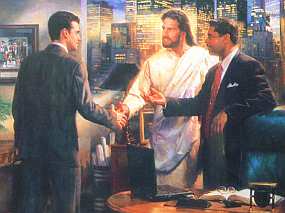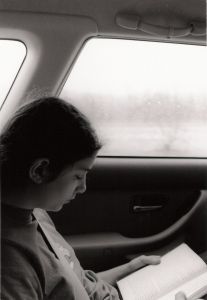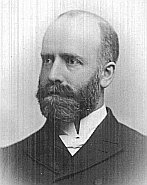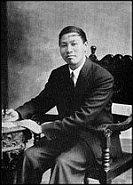Right now, I’m deeply enmeshed in edits for my novel. My whole being seems wired to the craft of writing at this moment, so I’m reading more fiction in order to stimulate my own chops.
So here comes the off-topic, obligatory writing post.
Having been sick most of last weekend, I finished three novels:
Monster by Frank Peretti
Presumed Guilty by James Scott Bell
Eleanor Rigby by Douglas Coupland
The first two are by Christian authors who typically fall into the Christian market. I can’t say anything about Douglas Coupland’s faith, but he sure can write.
I have some pretenses to being a novelist some day. Hoping to be listed as a novelist who is a Christian as opposed to the standard Christian novelist moniker, my current work is aimed squarely at the secular marketplace. However, having a Christian main character forced my book into the Christian marketplace. Any pretenses I had at being a “bridge” author collapsed the second most secular publishers decided to jump on the Christian bandwagon. With the Christian fiction marketing growing faster than any other (and with sales to match), I suspect I’m typecast. “Your character’s a Christian, well, that’ll be great for our new Christian imprint!”
Ugh.
But I digress…
After reading a book like Monster or Presumed Guilty, I’ve finally concluded why I read so little Christian fiction. It’s not that the writing isn’t good (it’s improving daily), or the stories aren’t interesting (the creative dam has burst in that regard), but I just can’t get past the characters.
Every time I read a work of Christian fiction, I struggle immensely with the characters. A secular novel like Coupland’s Eleanor Rigby lives or dies by the quality of its characterizations and the quasi-magic-realism that enlivens that author’s works.  But every time I pick up a Christian novel, the same question comes through: Who ARE these people?
But every time I pick up a Christian novel, the same question comes through: Who ARE these people?
I feel like the characters in most Christian novels dropped to Earth from another planet light years away from my normal existence. They don’t resemble any Christians I’ve ever met in my life. If identifying with the characters grabs a reader, each time I read a work of modern Christian fiction, I’m tempted to haul out my old college anthropology texts to see if they can shed some light on the humans that inhabit these books.
Not to pick on Bell too much, but he writes a pastor’s wife with a semi-lurid past who’s been neglecting her husband in the intimacy department. When she hears he just sold a big book deal worth millions, she decides to slither into her tight jeans and frilly blouse, then put out a couple of glasses of sparkling apple cider. What she doesn’t know is that her husband’s in a motel room getting a few intimacy lessons from a pornstar.
Now I don’t know about you, but I read that and just scratch my head. Never mind that pastors all across this country are supposedly struggling with the issue of how to keep from succumbing to the temptations of the pornstars they counsel. What’s the deal with the tame response of a wife trying to save her marriage? I can’t speak for every Christian woman out there, but is that realistic—even in the slightest? Tight jeans and a couple of glasses of fizzy apple cider? Now one could assume that Bell’s not trying to titillate here, so he plays to the censors and keeps it tame. But then the husband’s out having an affair with a pornstar, so what’s the titillation factor on that one?
This illustrates the problem of plastic characterization that’s the bane of most of the Christian fiction I read. The people in these books don’t talk, pray, romance, play, or act in any way that seems real.
In contrast, when Coupland talks about the peace his protagonist’s made with her loneliness, man, I’m right there inside her head:
We cripple our children for life by not telling them what loneliness is, all of its shades and tones and implications. When it clubs us on the head, usually just after we leave home, we’re blindsided. We have no idea what hit us, We think we’re diseased, schizoid, bipolar, monstrous and lacking in dietary chromium. It takes us until we’re thirty to figure out what it was that sucked the joy from our youth, that made our brains shriek and burn on the inside, even when our exteriors made us as confident and bronzed as Qantas pilots. Loneliness.
Now you may not agree with all that, or fail to identify with each point, but I’ve got to believe that some of that got through and resonated on some level with you. More so than a wife hoping to spice up her marriage with a bottle of sparkling apple cider.
The curse on all Christian fiction is not that Christians are a diverse lot and not every characterization is going to work, but that Christians are a diverse lot, yet we seem to be ashamed of our own diversity. We don’t tend to enjoy living all that much, either. There’s dying to self and then there’s asceticism.
If I wrote that pastor’s wife, I’d have her go out and buy a fake fur, a bottle of good port, and then have her greet the husband holding two full glasses, wearing the fur, a smile, and nothing else. Why? Because it’s more real, more alive, more human. And most of all, it’s more joyful.
But here’s where the shame at our diversity comes in. As real as that might be as I choose to pen it, too many Christians would howl. And they’d probably howl as much about the port as they would the naked pastor’s wife in a fur. Others would have no problem with a scene like that. But to make all characters palatable to all persuasions of Christians, we have to whittle them down until they’re unrecognizable.
What that leaves is characters who are curiously two-dimensional, free of zest, and who epitomize a sort of barrenness that should never be part of a grace-filled life. Worst of all, it salutes characters who were more interesting prior to meeting Christ than afterwards. What a sad statement to make!
Perhaps we Christian readers are too easily offended. I know so many Christians who watch a show like Desperate Housewives on TV, then turn around and shout out, “Well, I never!” when reading a Christian work that deals with the same content, albeit with true redemption offered. Maybe we like plastic characters who endorse our particular brand of Christianity, even if we ourselves don’t resemble those characters.
Several Christian novelists read this blog, and if you’re reading this now, I hope that I haven’t offended you in any way. Truthfully, I feel for the situation we’re in, always trying to please all of the people all of the time. I know that I’ve struggled with that immensely in my novel, where the characters enjoy wine with a meal, have never read Joshua Harris’s I Kissed Dating Goodbye, enjoy dancing, and grow in the Lord by ditching sanitized Evangelical stereotypes of what two twenty-something Christians must be.
We can do better if we move beyond appealing only to the widest audience. Christian fiction is growing, but if we’re to truly write redemptive works, we’ve got to take more chances. The call is out to be “grittier,” yet Presumed Guilty is as gritty as it can be, while still giving us characters whose Christianity is so odd that we can’t relate at all. Nor do we need to foul up our Christian characters until they’re just one smidgeon away from being considered unregenerate. Just make them real people, even when they’re facing unreal circumstances.

 I thought I'd have my novel completed in January.
I thought I'd have my novel completed in January. no one bothered to shed some light on the man who lends his name to that Institute,
no one bothered to shed some light on the man who lends his name to that Institute,  Perhaps it is because of Murray's soothing pastoral heart that he's not ripe for controversy, but I contend that in an age when so many Christians are at odds, Murray's vast output of writings are more needed than ever. (Bio of Murray
Perhaps it is because of Murray's soothing pastoral heart that he's not ripe for controversy, but I contend that in an age when so many Christians are at odds, Murray's vast output of writings are more needed than ever. (Bio of Murray  Nee is a man wholly surrendered to the Lord and his writings have profound depth. What else can be expected from a man who spent the majority of his Christian life locked up in solitary confinement in a Communist prison cell? Many today would claim that Nee's devotion to the Lord is the reason the Chinese house church movement is still going strong. (Nee bio
Nee is a man wholly surrendered to the Lord and his writings have profound depth. What else can be expected from a man who spent the majority of his Christian life locked up in solitary confinement in a Communist prison cell? Many today would claim that Nee's devotion to the Lord is the reason the Chinese house church movement is still going strong. (Nee bio